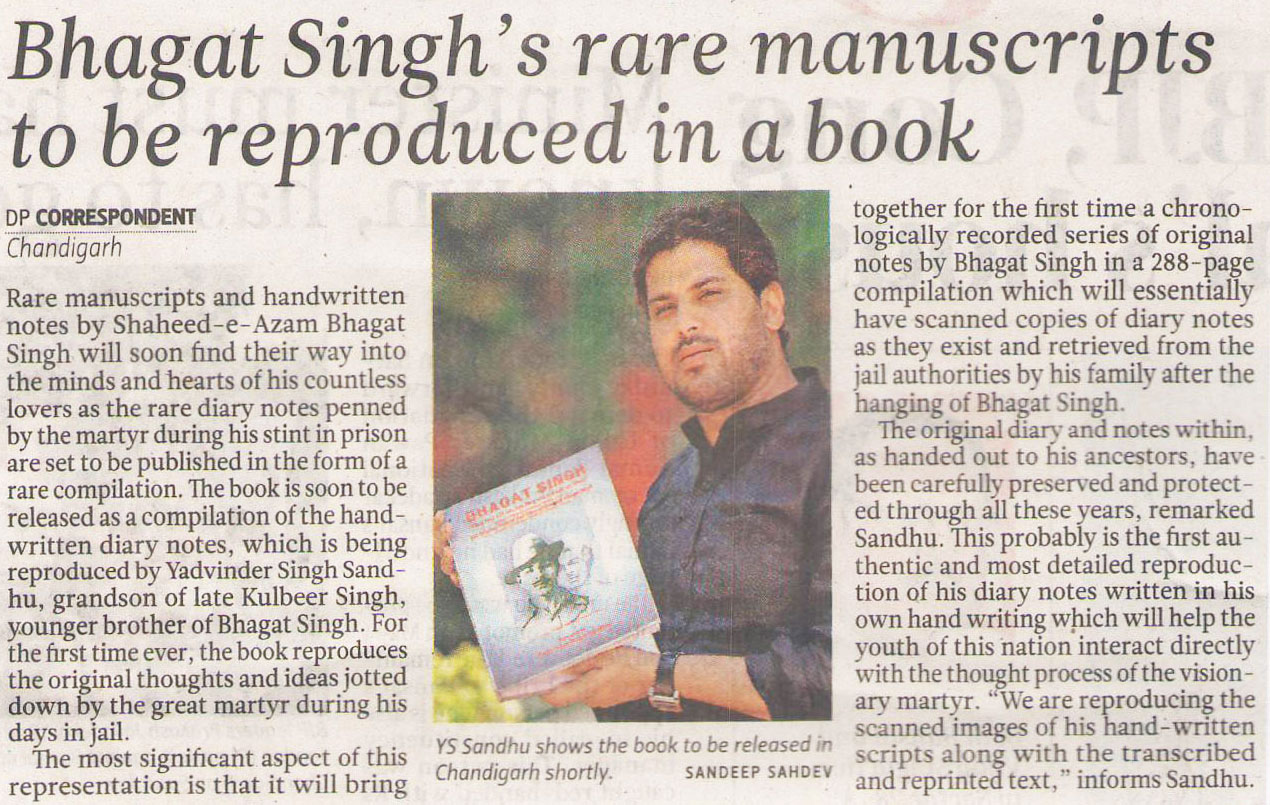Bhagat Singh's Rare Manuscripts to be Reproduced in a Book
The legacy of Shaheed-e-Azam Bhagat Singh, one of India's most revered freedom fighters, is set to be immortalized through a groundbreaking publication. Rare manuscripts and handwritten notes by Bhagat Singh, penned during his incarceration, are soon to be released in a meticulously compiled book. This significant project is being spearheaded by Yadvinder Singh Sandhu, the grandson of Kulbeer Singh, Bhagat Singh's younger brother. For the first time, the book will provide a comprehensive reproduction of the original thoughts and ideas of Bhagat Singh, as recorded in his jail diary.

Preserving a Revolutionary's Legacy
Bhagat Singh's jail notebook, which has been carefully preserved by his family since his execution, holds a treasure trove of insights into his revolutionary mind. These diary notes, retrieved from the jail authorities after Bhagat Singh's hanging on March 23, 1931, offer a unique glimpse into his thoughts during his imprisonment. Yadvinder Singh Sandhu has taken on the task of ensuring that these invaluable documents are made accessible to the public in their most authentic form.
"The original diary and notes, as handed out to my ancestors, have been carefully preserved and protected through all these years," remarked Sandhu. This statement underscores the meticulous care taken by the family to maintain the integrity of Bhagat Singh's writings. The upcoming book aims to reproduce these notes in a way that allows readers to engage directly with the martyr's thought process.
A Chronological Compilation
One of the most significant aspects of this publication is its chronological organization. For the first time, readers will have access to a series of Bhagat Singh's notes arranged in the order they were written. This 288-page compilation will feature scanned copies of the original diary entries alongside transcriptions and reprinted text. This dual presentation ensures that the authenticity of Bhagat Singh's handwriting is preserved while also making the content accessible and readable.
"We are reproducing the scanned images of his handwritten scripts along with the transcribed and reprinted text," Sandhu explained. This approach not only preserves the visual authenticity of Bhagat Singh's notes but also facilitates a deeper understanding of his writings.
Connecting with a Visionary
The publication of Bhagat Singh's jail diary is poised to be a landmark event, offering a direct connection to the thoughts and philosophies of one of India's greatest martyrs. The book will allow readers, especially the youth, to engage with the visionary ideas that guided Bhagat Singh's actions. His reflections on freedom, justice, and societal progress are as relevant today as they were during the struggle for independence.
By presenting these notes in their original form, the book aims to provide an unfiltered view of Bhagat Singh's intellectual journey. This authenticity is crucial for understanding the depth of his commitment to India's freedom and his vision for a just and equitable society.
Historical Context
Bhagat Singh, born on September 28, 1907, in Punjab, emerged as a prominent revolutionary figure in the Indian independence movement. His involvement in the freedom struggle, marked by his daring acts of defiance against British colonial rule, made him a symbol of resistance. His execution at the young age of 23 only served to amplify his status as a martyr and a hero.
During his imprisonment, Bhagat Singh continued to write extensively, reflecting on various aspects of the freedom struggle, political ideology, and social justice. His writings from this period provide a rich source of insight into his revolutionary spirit and intellectual prowess.
Impact on Future Generations
The publication of Bhagat Singh's jail notes is not just an academic exercise; it is a means to inspire future generations. By bringing these writings into the public domain, Sandhu hopes to ignite a sense of patriotism and commitment to social justice among young Indians. The book will serve as a bridge between Bhagat Singh's time and the present, reminding readers of the enduring relevance of his ideals.
Educational Value
In addition to inspiring individuals, the book holds significant educational value. It can be used as a resource in schools, colleges, and universities to teach students about the life and contributions of Bhagat Singh. The detailed reproduction of his notes offers a primary source of historical material, providing an authentic glimpse into the thoughts of a revolutionary leader.
A National Treasure
Bhagat Singh's jail diary is a national treasure, and its publication in this format is a significant contribution to India's historical and cultural heritage. By preserving and sharing these notes, Sandhu is ensuring that Bhagat Singh's legacy continues to inspire and educate. The book will serve as a testament to the enduring power of his ideas and the timeless relevance of his vision for an equitable and democratic society.
